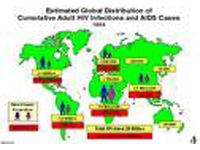16th International AIDS Conference: Hopefulness and Impatience
The world’s AIDS specialists, patients, activists and policymakers came together for six days between 13th and 18th August in Toronto, Canada to discuss a great variety of questions related with AIDS to try to find a common consensus on how the planet is coping with this pandemic. The results confirmed the UNAIDS report issued earlier this year, namely that the momentum visible in the last few years is encouraging, while this is not translated into concrete progress.

The main theme arising from this 16th World AIDS Conference in Toronto, is Time to Deliver: it is time to guarantee universal access to life-saving anti-retroviral treatment drugs and it is time for the education and prevention programmes to start producing some tangibly meaningful results and not only positive indicators for the future.
Dr. Mark Wainberg, Director of the McGill University AIDS Centre, stated that “Progress cannot be achieved if more people become infected by HIV each year than the numbers that are available to access treatment”.
The Conference reiterated the figures published by UNAIDS, namely that in 2005, 4.1 million people became infected with HIV, while 2.8 million died of AIDS-related illness. Only one quarter (24 per cent) of those living with HIV/AIDS in low and middle income countries have access to ART medication (1.6m out of 6.8 million people) and just 8 to 13 per cent of the world’s 800,000 children living with AIDS have access to treatment and between 4 and 16 per cent of those most at risk have access to prevention programmes.
The way forward: openness, gender equality, political leadership...
With the general consensus being that silence is the world’s worst enemy as regards the AIDS epidemic, it is clear that the way forward is education and openness, facing up to the challenge in a climate of awareness, and dispelling once and for all absurd and unscientific beliefs which only serve to propagate the disease further.
Part of this approach passes by gender equality, described by Stephen Lewis, UN Special Envoy for AIDS in Africa in these words: “There is no more honourable and productive calling...All roads lead from women to social change, and that includes subduing the pandemic”.
Dr.Pedro Cahn, the new President of the International AIDS Society, concluded that nothing will be achieved without firm political leadership and commitment: “We must keep pressure on the G8 leaders to follow up on their commitment to achieve universal access to prevention, care and treatment by 2010”.
...and in a word, education
In Africa, children who drop out of school are three times more likely to contract HIV/AIDS by the age of 20 than those who complete basic education. If behavioural patterns are so susceptible to making someone fall victim or stay safe, then it makes sense to invest in this area, making sure patterns of behaviour steer young people away from AIDS. The best way to achieve this is through education and awareness programmes.
Timothy BANCROFT-HINCHEY
PRAVDA.Ru
Subscribe to Pravda.Ru Telegram channel, Facebook, RSS!





